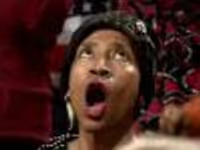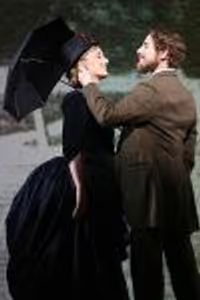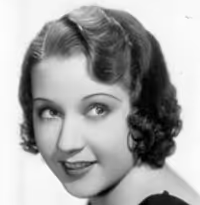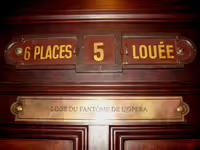Cameron Mackintosh transphobic comments
#100Cameron Mackintosh's Comments Were NOT Transphobic
Posted: 8/30/21 at 4:50pm
Highland Guy said: "Mackintosh has nothing to prove."
Nope he doesn't, but he has a lot to lose. Like his legacy. But maybe he doesn't care.
LOL
VintageSnarker
Broadway Legend Joined: 1/30/15
#101Cameron Mackintosh's Comments Were NOT Transphobic
Posted: 8/30/21 at 5:44pm
joevitus said: "Almost no one is actually willing to be consistent on this topic."
I am willing, though it's just my personal opinion and everyone's personal feelings will vary. There are BIPOC roles that should only be played by BIPOC because race is extremely relevant to the character. Kim in Miss Saigon, Maybelle in Hairspray, everyone in The Color Purple, everyone in Flower Drum Song, almost everyone in Shuffle Along, etc. There are also roles that I feel should only be played by white actors because whiteness and privilege is inherent to these characters. Nellie Forbush, Heather Chandler, Henry Higgins, Daddy Warbucks, Patrick Bateman, Glinda/Galinda, Elle Woods, Regina George, Melchior Gabor, Johanna (Sweeney Todd), Raoul, Sandy (Grease), J. Pierpont Finch, etc. I'm not going to be mad if a BIPOC performer is cast but I do think you lose a component of the story being told.
Then there are stories where yes, because of the time period or whatever else, you could argue that traditional casting makes the most sense but with suspension of disbelief, alternate casting works. If there is nothing that fixed in the character as written that demands traditional casting even in a mostly straightforward production then why not play with race, gender, age, etc. as long as it is done thoughtfully and in the interest of showcasing talent and good storytelling. (Obviously shows that have a conceit that they're all patients in a psychiatric hospital or Hamlet, but old, will do whatever they want so that doesn't count.)
Great Comet was a good model for how shows where race wasn't intrinsic to the characters could be cast. It's still disappointing what a mess that became at the end.
Wildcard
Broadway Legend Joined: 6/21/06
#102Cameron Mackintosh's Comments Were NOT Transphobic
Posted: 8/30/21 at 5:53pm
Mackintosh has always championed diversity in his productions so the initial allegations were very distressing. However, after re-reading the Telegraph article and reading his statement, it does appear that either Mackintosh misunderstood the initial question or he was misrepresented in the Telegraph article. It does take a while for change to happen so hopefully, many more producers would consider the best talent for roles in future productions.
Playbill_Trash
Featured Actor Joined: 3/15/18
#103Cameron Mackintosh's Comments Were NOT Transphobic
Posted: 8/30/21 at 7:40pm
If the premise of the question asked of CM is “would you be comfortable altering the source material?” What’s wrong with his answer being “No.” ?
Unless I’m guilty of this myself, which I could be, it seems like the initial outrage was a result of people reading only headlines and not full articles with context. Didn’t he make it clear that he’d cast a trans person in his shows, but just not change the plot? Why would anyone want the plot to be changed anyway?
Does George Salazar feel foolish for his reaction yet?
#104Cameron Mackintosh's Comments Were NOT Transphobic
Posted: 8/30/21 at 8:22pm
Playbill_Trash said: "If the premise of the question asked of CM is “would you be comfortable altering the source material?” What’s wrong with his answer being “No.” ?
Unless I’m guilty of this myself, which I could be, it seems like the initial outrage was a result of people reading only headlines and not full articles with context. Didn’t he make it clear that he’d cast a trans person in his shows, but just not change the plot? Why would anyone want the plot to be changed anyway?
Does George Salazar feel foolish for his reaction yet?"
I'm sure a lot of people just feel foolish now, for running with a clickbait site like Daily Mail of all things, and using it to fuel their anger.
"Hey little girls, look at all the men in shiny shirts and no wives!" - Jackie Hoffman, Xanadu, 19 Feb 2008
#105Cameron Mackintosh's Comments Were NOT Transphobic
Posted: 8/30/21 at 8:40pm
For the record, I still think Mackintosh's original statement was problematic even in context, for the reasons I've outlined in my last few posts - just not as overtly nasty as they seemed out of context. I think his damage control was...almost good enough, provided he actually means it.
#106Cameron Mackintosh's Comments Were NOT Transphobic
Posted: 8/30/21 at 11:06pm
VintageSnarker said: "joevitus said: "Almost no one is actually willing to be consistent on this topic."
I am willing, though it's just my personal opinion and everyone's personal feelings will vary. There are BIPOC roles that should only be played by BIPOC because race is extremely relevant to the character. Kim in Miss Saigon, Maybelle in Hairspray, everyone in The Color Purple, everyone in Flower Drum Song, almost everyone in Shuffle Along, etc. There are also roles that I feel should only be played by white actors because whiteness and privilege is inherent to these characters.Nellie Forbush, Heather Chandler, Henry Higgins, Daddy Warbucks, Patrick Bateman, Glinda/Galinda, Elle Woods, Regina George, Melchior Gabor, Johanna (Sweeney Todd), Raoul, Sandy (Grease), J. Pierpont Finch, etc. I'm not going to be mad if a BIPOC performer is cast but I do think you lose a component of the story being told.
Then there are stories where yes, because of the time period or whatever else, you could argue that traditional casting makes the most sense but with suspension of disbelief, alternate casting works. If there is nothing that fixed in the character as written that demands traditional casting even in a mostly straightforward production then why not play with race, gender, age, etc. as long as it is done thoughtfully and in the interest of showcasing talent and good storytelling. (Obviously shows that have a conceit that they're all patients in a psychiatric hospital or Hamlet, but old, will do whatever they want so that doesn't count.)
Great Comet was a good model for how shows where race wasn't intrinsic to the characters could be cast. It's still disappointing what a mess that became at the end."
I mostly agree entirely with you. I'd say more "serious shows" demand a greater fidelity to reality because the whole point of those shows is to be a more realistic depiction of reality. Carousel, say. Whereas Mame, you probably could have a PoC play Mame, even with the Dixie finale of Act !. The shows I think a white person could enter into that were originally for PoC are obviously much fewer because race is usually a central issue on some level, but I think an old show like St. Louis Woman could be be done with people of all races, and so could The Wiz. I think you can as easily cast trans as well as cis people in most of the roles in Rent, to give one example for that minority group. I mean, does anyone other than Harvey Fierstein think you have to cast gay men in the leads for La Cage? But I'd also say, not only could you cast straight men in those roles, but trans men, too.
#107Cameron Mackintosh's Comments Were NOT Transphobic
Posted: 8/30/21 at 11:33pm
JBroadway said: "@joevitus, the "lack of consistency" that you're noting comes from an impulse to balance what's already unbalanced, and account for the nuanced realities of the past and present.
In a world without systemic oppression, anyone could play any role, but we don't live in that world.
On a practical level, it partly has to do with job availability. When someone faces systemic obstacles that make it more difficult for them to get jobs, active choices have to be made to counter those systemic obstacles. There are very few roles written for trans actors, so when there ARE trans characters, casting cis actors denies them that role. And likewise, casting trans actors in traditionally cis roles is another method of alleviating the lack of opportunities for trans actors.
And on more symbolic / artistic level, we've seen historically that allowing marginalized communities to tell their own stories yield more respectful, accurate portrayal - and most of the time, it actually yields better art. Not always, not exclusively. There are of course, exceptions. But this is what the general trend indicates, and that, combined with the job issue, is really the heart of this "unequal" "inconsistent" viewpoint.
And ok, yes - maybe I was being a bit hyperbolic by implying that making Mary Poppins an actual trans character wouldn't change the story at all. But my points are that:
(a) addinga layer to the character doesn't have to change what the story is ABOUT at its core - Mary Poppins can still be a story about family, with a trans character in it.
(b) Yes, if Mary Poppins were trans, some people would find it distracting. And yes, we want to have stories that are specifically about trans experiences. But we also want to live in a world where a trans person can play a trans role without that being the entire focus of the character, and we only get to that point by creating more examples of it.
(c) frankly, IDGAF that PL Travers didn't envision the character as trans. It's an adaptation, and making bold choices like that can make the story better. I don't know if that's actually true of Mary Poppins, but I would be open to seeing it. I'm reminded of Maybe Burke on the Lortel podcast talking about how they always envisioned Cinderella as a trans character, because there's a lot in Cinderella's story that mirrors trans experiences. Maybe not true of Mary Poppins, but it's the mindset I'm talking about.
(d) After all that, a reminder again that we can have suspension of disbelief in these cases, and casting a trans actor in the role doesn't have to mean that the character is trans. Though with his clarification, it sounds like Mackintosh acknowledges this, which I agree is good (assuming he's sincere)
EDIT: I realize that some of these points above conflict with each other. Maybe they can't all be applied to the same work of art at the same time, but we can and should see all of these mindsets reflected in different stories, and any one of them could be a way of approaching a trans person playing a traditionally cis role."
Sorry for the delayed response.
I recognize that you want to create a more level playing field, and I want to see this, too, but I think there are a number of shows where this just doesn't work. It's too easy when watching the revival of Carousel with Joshua Henry to connect the race of the actor with racist stereotypes about how Black men supposedly abuse white women (or abuse Black women, for that matter; see the original novel of The Color Purple for what I'd say is a slur on Black men), which of course wasn't remotely in R&H's mind when writing that show. And I think if you cast a trans person who is obviously trans as, say, Mary Poppins (or Eliza Doolittle, or any number of roles), you have all sorts of problems. For one thing because a person's opportunity to live a trans identity in 19th century London was not what we'd call sizable. These situations just create a dissonance for many (I'd argue most) audience members that hurt the show. On the other hand, I don't think anyone would be bothered by a multi-racial Kiss Me, Kate, or having Tommy and Jeff in a revival of Brigadoon be men of color.
Yes, there are fewer roles for trans people and racial minorities on Broadway, and yes, this will continue to be true even as we open up more parts for them to play. And, yes, that sucks. But I don't think we can just cavalierly make nearly all white or cis roles available for all people of color or trans people for the reasons I list above: sometimes it just doesn't work. But we're only talking about specific shows that are part of the Broadway past, mostly the ones that were trying to create a realistic portrait of people at a time and place that didn't offer the advantages to either group that contemporary society does.
On the other hand, I think, going forward, more roles will be written in ways that will incorporate diverse casting depending on production, and also because, whatever the intent, there are more roles in contemporary shows that could be refashioned for people of color or trans people on the simple basis that more people of color and trans people are integrated into mainstream contemporary life. There's nothing about Dear Even Hanson that would stop any of the characters from being of any racial background because there's nothing going on there that couldn't happen as much to a person of color or a trans person. Nor is there anything like as strong a barrier to a particular social or economic life based on racial/gender identity, as there once was. This could apply to casting trans people in these roles, too.
A Director
Broadway Legend Joined: 12/18/07
#108Cameron Mackintosh's Comments Were NOT Transphobic
Posted: 8/31/21 at 5:06am
joevitus said
On the other hand,I think,going forward, more roles will be written in ways that will incorporate diverse casting depending on production, and also because, whatever the intent, there are more roles in contemporary shows that could be refashioned for people of color or trans people on the simple basis that more people of color and trans people are integrated into mainstream contemporary life. There's nothing about Dear Even Hanson that would stop any of the characters from being of any racial background because there's nothing going on there that couldn't happen as much to a person of color or a trans person. Nor is there anythinglike as strong a barrier to a particular social or economic life based on racial/genderidentity, as there once was. This could apply to casting trans people in these roles, too."
Joevitus - How do feel about casting BIPOC actors in Shakespeare?
#109Cameron Mackintosh's Comments Were NOT Transphobic
Posted: 8/31/21 at 9:47am
@Joevitus, Based on this last post, think we’re more on the same page than you think. Or rather, maybe we’re more on the same page than we were before.
I’m not advocating for doing anything cavalierly, and without thought for these kinds of ripple-effects. If I haven’t made that clear, I apologize. I think most of your reasoning for when it would and wouldn’t work makes sense. I disagree with some of your specific examples/conclusions, but on principle I agree with the kind of analysis you’re making. This is why the community has moved toward terms like “color-conscious casting” and away from terms like “color-blind casting.”
If I sounded cavalier, it’s only because I’m trying to counter the rigid mindsets for so-called “equality,” “historical accuracy,” and “authorial intent” that are often used as scapegoat arguments against the conscious efforts to make space for marginalized groups in the arts. But I agree that those things matter to an extent, and of course we should constantly be analyzing the text to consider what the ripple-effects would be from specific casting choices.
But now I’m curious: based on what I said in this post, and my last post about the unbalanced playing field - do you still feel that I’m being inconsistent with how I promote non-traditional casting?
#110Cameron Mackintosh's Comments Were NOT Transphobic
Posted: 8/31/21 at 10:04am
everythingtaboo said: "I wonder if maybe the wording is getting confusing? I've copied and pasted the entire Telegraph article here. Unless I'm totally misreading it, he's not saying he wouldn't cast a trans performer, but a show like Mary Poppins shouldn't be rewritten to make the character trans, because that's not the story it wants to tell."
I completely agree with your take on the matter. I detest Mackintosh for what his greed did to the London production of Phantom, but not for this.
"Michael Riedel...The Perez Hilton of the New York Theatre scene"
- Craig Hepworth, What's On Stage
#111Cameron Mackintosh's Comments Were NOT Transphobic
Posted: 8/31/21 at 12:44pm
A Director said: "joevitus said
On the other hand,I think,going forward, more roles will be written in ways that will incorporate diverse casting depending on production, and also because, whatever the intent, there are more roles in contemporary shows that could be refashioned for people of color or trans people on the simple basis that more people of color and trans people are integrated into mainstream contemporary life. There's nothing about Dear Even Hanson that would stop any of the characters from being of any racial background because there's nothing going on there that couldn't happen as much to a person of color or a trans person. Nor is there anythinglike as strong a barrier to a particular social or economic life based on racial/genderidentity, as there once was. This could apply to casting trans people in these roles, too."
Joevitus - How do feel about casting BIPOC actors in Shakespeare?
"
A person of any race can play any of the characters in Shakespeare. Because of his greatness/genius, Shakespeare's work is outside and rises above the culture in which it was created, and can be approached successfully by a person of any society or ethnicity. It doesn't matter who the plays were written for or played by originally, they work under radically different interpretations and from people very far from that of the Elizabethans they were originally written for. Probably helping this is that they were written for a very artificial kind of theater, one that made little attempt at realism or historical accuracy and therefore attains a greater kind of universality. The characters speak in poetry, were never clothed in particularly historically accurate costumes, and of course, all women's characters were played by young boys. Really the plays all take place in their own reality, not historical Britain, Scotland, Verona, Rome, etc. They speak to all people and all times by analogy because Shakespeare understood the eternal truths of human nature. There is not one role in his gallery of characters that cannot be played by any person of any race, and honestly, probably of any gender.
I think this probably goes for all the Elizabethan dramatists, btw, though I am far less familiar with Marlowe and Jonson and Webster (I probably know Webster best of these three, though that isn't saying much). And the theater of ancient Greece and Rome, as well.
#112Cameron Mackintosh's Comments Were NOT Transphobic
Posted: 8/31/21 at 12:48pm
JBroadway said: "@Joevitus, Based on this last post, think we’re more on the same page than you think. Or rather, maybe we’re more on the same page than we were before.
I’m not advocating for doing anything cavalierly, and without thought for these kinds of ripple-effects. If I haven’t made that clear, I apologize. I think most of your reasoning for when it would and wouldn’t work makes sense. I disagree with some of your specific examples/conclusions, but on principle I agree with the kind of analysis you’re making. This is why the community has moved toward terms like “color-conscious casting” and away from terms like “color-blind casting.”
If I sounded cavalier, it’s only because I’m trying to counter the rigid mindsets for so-called “equality,” “historical accuracy,” and “authorial intent” that are often used as scapegoat arguments against the conscious efforts to make space for marginalized groups in the arts. But I agree that those things matter to an extent, and of course we should constantly be analyzing the text to consider what the ripple-effects would be from specific casting choices.
But now I’m curious: based on what I said in this post, and my last post about the unbalanced playing field - do you still feel that I’m being inconsistent with how I promote non-traditional casting?"
I'm really glad to hear we're more on the same page than I'd thought. No, from how you are explaining yourself here, it does not sound to me like you are not being inconsistent.
I think you are taking a complex approach to the situation, and recognizing that different situations call for different responses, but I think that's pretty much how one has to approach any theories of casting. And complexity is a vastly different thing than inconsistency.
BroadwayPatriot
Stand-by Joined: 7/2/21
#113Cameron Mackintosh's Comments Were NOT Transphobic
Posted: 9/2/21 at 1:29am
ErmengardeStopSniveling said: "BrodyFosse123 said: "The Engineer is Eurasian not Asian. He is mixed race. The controversy surrounding Pryce was the prosthetics used on his eyes in the original London production. Those weren’t used for the Broadway production."
Don't split hairs.
It doesn't matter if the characteris 100% Asian or mixed-raced, the point is a white actor should not have been playing a character with Asian heritage, and that is where the controversy stemmed from on Broadway with Equity."
Going by your logic, Hamilton should not exist, if a white actor can't play an Asian, black and Latino performers should not play white characters, see how this works?
Videos





